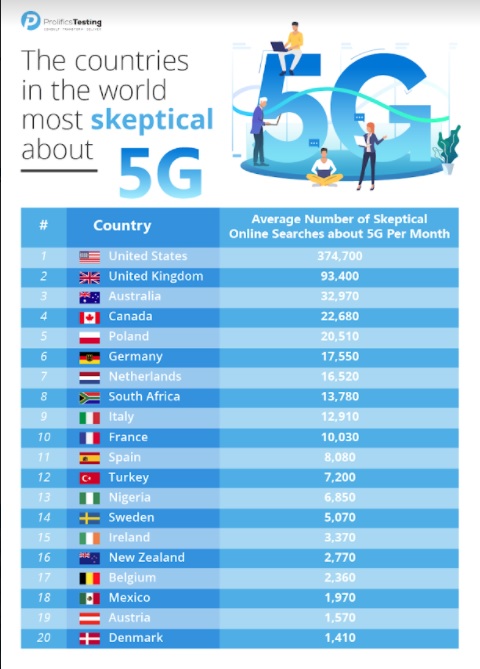Study: U.S. Tops in Skeptical 5G Searches
Americans do most online searching related to concerns about next gen wireless
The smarter way to stay on top of the multichannel video marketplace. Sign up below.
You are now subscribed
Your newsletter sign-up was successful
Americans are the most skeptical about 5G according to a study of online searches related to various concerns, mostly health concerns, about the next generation networks that the U.S. is determined to win the worldwide race.
A just-released study by Prolific Testing found that among 155 countries studies, the U.S. generated an average of 375,000 "consistently recurring Google searches" per month on these five queries: "Is 5G dangerous? Does 5G have health risks? Is 5G safe? Is 5G harmful?" and even the seemingly patently absurd: "Does 5G cause/spread coronavirus (Covid19)."

Also Read: Court Hears Challenge to FCC Radiofrequency Guidelines
That is despite the World Health Organization's conclusion that "no adverse health effect has been causally linked with exposure to wireless technologies," including 5G. The FCC cited a similar finding by the Food and Drug Administration in declining to tighten its RF radiation limits.
In distant second in the list of countries with "skeptical" 5G searchers was the UK with an average of about 93,000 per month, followed by Australia with about 33,000 per month.
At the other end of the spectrum was Denmark, with only about 1,400 "skeptical searches" per month.
The FCC has been hearing from some of those 5G skeptics as it advances 5G through a series of spectrum auctions and network security measures.
The smarter way to stay on top of the multichannel video marketplace. Sign up below.
The U.S. Court of Appeals for the D.C. Circuit last month heard oral argument Monday (Jan. 25) in the case of groups trying to force the FCC to rethink its radio-frequency exposure guidelines for, among other things, Wi-Fi, 5G, cell phones, cell towers and more.
In 2019, the FCC decided not to change its RF emission exposure limits or how it evaluates those limits for mobile device use, resolving a 2013 order and notice of inquiry into the issue.
Also Read: FCC Tells Berkeley to Stay Out of Its RF Lane
Saying it took to heart the FDA's findings that "t]he weight of scientific evidence has not linked cell phones with any health problems," the commission voted unanimously--with commissioner Jessica Rosenworcel concurring, which is short of a full-throated "aye," to retain the current limits, but to adjust the rules" to ensure the health and safety of workers and consumers of wireless technology, while also clarifying and streamlining rules to reduce regulatory burdens on licensees."
The FCC argues that at the power limits opponents of its standards want to impose--a million times less powerful, for example--the relevant communications systems, like 5G and Wi-Fi--won't work.
Contributing editor John Eggerton has been an editor and/or writer on media regulation, legislation and policy for over four decades, including covering the FCC, FTC, Congress, the major media trade associations, and the federal courts. In addition to Multichannel News and Broadcasting + Cable, his work has appeared in Radio World, TV Technology, TV Fax, This Week in Consumer Electronics, Variety and the Encyclopedia Britannica.

